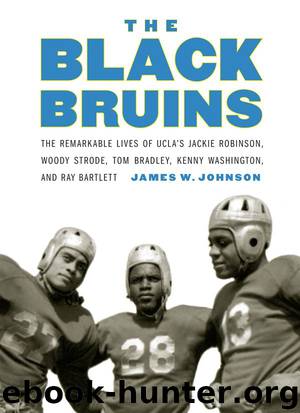The Black Bruins: The Remarkable Lives of UCLA's Jackie Robinson, Woody Strode, Tom Bradley, Kenny Washington, and Ray Bartlett by James W. Johnson

Author:James W. Johnson [Johnson, James W.]
Language: eng
Format: epub
Tags: SPO019000 Sports & Recreation / History, SOC001000 Social Science / Ethnic Studies / African American Studies, HIS036140 History / United States / State & Local / West (ak, Ca, Co, Hi, Id, Mt, Nv, Ut, Wy)
ISBN: 978-1-4962-0455-4
Publisher: University of Nebraska Press
Published: 2017-11-15T16:00:00+00:00
19
The Negro League Years
“The plate is the same width. The bases are the same—ninety feet apart. I’ve got to make good.”
—Jackie Robinson
Jackie Robinson was fed up with playing in the Negro Leagues. The travel was fatiguing, and the meals were lousy. “You were lucky if [restaurants] magnanimously permitted you to carry out some greasy hamburgers in a paper bag with a container of coffee,” he recalled. “You were really living when you were able to get a plate of cold cuts. You ate on board the team bus or on the road.” The players often slept on the rickety old buses on the way to the next town because hotels wouldn’t take them. If there were hotels that took blacks, they had no eating facilities. Robinson was ready to return to California. He saw no future in black baseball. He wanted to marry his college sweetheart, Rachel, and still sought to land a job as a high school coach.
On August 24, 1945, Robinson was at Chicago’s Comiskey Park, home of the White Sox and also where the black teams played when the White Sox were on the road. Clyde Sukeforth, a Brooklyn Dodger scout, walked onto the field to talk with Robinson. He told Robinson that Branch Rickey had heard of Robinson’s talents and wanted to talk with him. Sukeforth asked to meet with him that night. Then he asked Robinson to travel to Brooklyn to meet with Rickey on the pretense that the Dodger boss wanted him to play for the Brooklyn Brown Dodgers in a new league being formed for black players. It took some talking, but Robinson finally said he would come. “I was thinking that this might be a gag, a cruel gag,” Robinson said. “I didn’t dare think of becoming a Dodger. Hundreds of things entered my mind, and I was still thinking when we got off the train in New York.”
Who was this Branch Rickey he was going to meet? As the great sportswriter Red Smith described him, he was “a player, manager, executive, lawyer, preacher, horse-trader, spellbinder, innovator, husband and father and grandfather, farmer, logician, obscurantist, reformer, financier, sociologist, crusader, father confessor, checker shark, friend and fighter, Judas Priest, what a character.” The sixty-four-year-old Rickey wore a hat most of the time under which bushy eyebrows wiggled up and down. A gruff voice came out over his bowtie, while his pudgy body strained the buttons on his natty suit. He often held a cigar in his hand, from which he took an occasional puff. He neither drank nor cussed. He amassed a fortune during his baseball years.
What transpired was an intense three-hour meeting in which Rickey was going to get his way. Rickey “just stared and stared,” Sukeforth recalled. “That’s what he did with Robinson—stared at him as if he were going to get inside the man. And Jack stared right back at him. Oh, they were a pair, those two. I tell you, the air in that office was electric.” Rickey told Robinson that he wanted him to play for the National League club, not a black team.
Download
This site does not store any files on its server. We only index and link to content provided by other sites. Please contact the content providers to delete copyright contents if any and email us, we'll remove relevant links or contents immediately.
Kitchen confidential by Anthony Bourdain(2325)
Dry by Augusten Burroughs(1692)
I Know Why the Caged Bird Sings by Maya Angelou(1596)
Kitchen Confidential by Anthony Bourdain(1533)
KITCHEN CONFIDENTIAL Adventures in the Culinary Underbelly by Anthony Bourdain(1453)
A Child Called It by Dave Pelzer(1411)
I know why the caged bird sings by Maya Angelou(1378)
A Heartbreaking Work of Staggering Genius by Dave Eggers(1369)
Taken by J. C. Owens(1285)
all by Unknown Author(1246)
Zeitoun by Dave Eggers(1229)
Extraordinary, Ordinary People by Condoleezza Rice(1211)
A Stolen Life by Dugard Jaycee(1160)
House of Darkness House of Light by Andrea Perron(1160)
The Farm in the Green Mountains by Alice Herdan-Zuckmayer(1144)
Law Man by Shon Hopwood(1143)
The Big Sea by Langston Hughes(1095)
The Year of Yes by Maria Headley(1072)
Dewey: the Small-Town Library Cat Who Touched the World by Vicki Myron & Bret Witter(1016)
